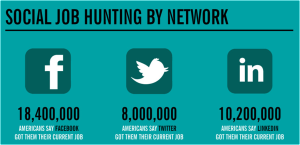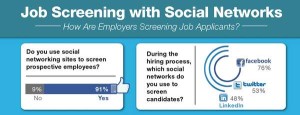Using Social Media for Employment: LinkedIn, Twitter and Facebook
Using Social Media for Employment
Social media continues year on year to grow and to expand. In this article we look at using social media for employment purposes. Each year new social media platforms emerge, exploring different avenues, allowing their users to express every aspect of their lives. Due to this it is no surprise that social media has become a job centre of sorts, allowing employers to survey the field of candidates and for employees to present themselves.
Increasingly the number of people, Tweeting, Facebooking and LinkedIn-ing their way to meaningful employment, is on the rise. More and more people are using social media for employment searches. The majority of people searching for work now have a LinkedIn account. However people are also using auxiliary platforms such as Facebook and Twitter to find work too. It is not only those seeking employment who are making use of social media. Recruiters too are increasingly using social media as an archive when researching and seeking candidates for job vacancies. An increasing number of corporate companies and global businesses are utilising their social media pages, whether Facebook or Twitter to advertise their graduate schemes. Below is a guide to using various social media platforms to help you gain employment.
Using Social Media for Employment – LinkedIn:
This is the realm of recruiters, who spend hours each day trawling the site in search of candidates. If you are thinking of using social media for employment opportunities setting up a LinkedIn account should be the first thing any job searcher does. If you have never used LinkedIn watch this FAQ video for a quick and easy walkthrough: http://www.youtube.com/watch?v=jnx9t8IwLzI.
LinkedIn is the superlative of social media platforms for finding employment. The platform provides a professional online portfolio for users. You are shooting yourself in the foot by not using this as part of your social media job search. Simply upload your C.V. to the site. Then fill your profile with recommendations from employers and people you have done work or projects for. Then build up a list of contacts and connections in your chosen field.
It is important you make it clear to prospective employers what field of work you do and are looking for. If you are looking for a specific job, then let people know by posting content relevant to the job you seek. It is imperative that your profile is professional and the best it can be. As it will be the first port of call for prospective employers when assessing you for eligibility.
It is also a good tool to look at who your friends, family and former colleagues are connected too. Don’t be afraid to use their contacts. You never know who they could be able to connect you with! LinkedIn also provides job postings, allowing you to search for people by their company. This is an excellent tool allowing you to research companies which you may wish to join.
Using Social Media for Employment – Twitter:
You may be reluctant to join what has been coined the “Twitterati”, many of the under 25 year olds have remained loyal to Facebook as their social media platform of choice. The main advantage of Twitter is that the format makes it much easier for users to connect with other users they do not know. Also the format is far more casual. Following is less formal than connecting with people on LinkedIn.
If you are keen to use Twitter as a tool for your social media employment hunt but have not used the platform previously, the following video provides a walkthrough: http://www.youtube.com/watch?v=aI2w9s75NT8&feature=related.
Users tend to follow other users who share mutual interests. This means the platform is a great forum to connect with users in the same industry as that which you intend to join. The key is to follow companies you are interested in. Also follow key members of these businesses. However you cannot merely tag along and expect results. Get involved with the discussions and the debates surrounding the areas of employment you wish to join. Be fearless; don’t be afraid of Tweeting directly to companies and influential people!
Keep your fingers to the pulse. Be vigilant for breaking news and trends, and ensure you are one of the first to offer your opinion on these issues. Doing this is an excellent way of creating your own following.
An excellent tool to utilise is the Twilert option. This feature allows you to set up alerts to keywords, alerting to you to discussions and employment opportunities.
Twitter is an excellent tool in using social media for employment. A large majority of companies and businesses use the platform to announce job vacancies. In order to ensure success, regularly search for jobs in your chosen industry. Twitter also allows users to connect directly to companies in order to enquire about vacancies. With this moderation is the key. Do not bombard prospective employers with spam-like barrages of generic tweets.
Similar to LinkedIn, regularly checking and renewing your profile is essential. To use Twitter effectively in the social media based job search make sure you have a professional profile. A good profile should include: a short biography, where you are from, your real name, a good picture of you and also a link to your website, blog or LinkedIn profile.
Using Social Media for Employment – Facebook:
When searching for a job, who you know and contacts prove essential, in this aspect Facebook comes into its own. A good strategy to use when seeking employment, is to post a note, doing this ensures that it stays on your friends feeds for longer. In the note explain that you are seeking employment, and that any leads or contacts would be greatly appreciated. Regardless of the kind of job you are looking for, people will be keen to help. In many cases the response you receive may be surprising.
Another good strategy to utilise in search of employment is to like the pages which are strictly dedicated to recruitment companies and programs. The benefits of this are twofold. Firstly it will inform you of any vacancies which you may be interested in. But secondly it can provide an insightful education into what the ethos and ethics of a company are, and what they look for in potential employees.
Another key resource to tap into on Facebook is groups. There is a selection of groups covering everything from: Graduate schemes, to school leavers programs to apprenticeships. These groups provide an excellent format where you can discuss the ins and outs of becoming employed with peers. Also successful candidates often return to the page and provide insight and experience into becoming employed.
How to ensure social media doesn’t play against you:
Ensure that your personal Facebook profile has a mature and professional profile picture. Recruiters often use Facebook profiles as the first port of call when assessing potential candidates. They are also known to check Twitter and LinkedIn profiles, often if they do not like what they see they will not invite the candidate to interview stage.
When using social media as a tool for employment, you are essentially your own PR agent. This means you have to hide or remove any dubious or potentially damaging content. This may mean de-tagging yourself from dubious pictures and presenting yourself professionally. Correct mental attitude is the key. Setting your Facebook profile to the highest security settings is also a good idea. Also go back through your page feed history and remove anything which may be damaging to you.
The key to using a social media website for employment is to create a positive image for yourself. A little bit of effort makes all the difference in separating you from the crowd.






